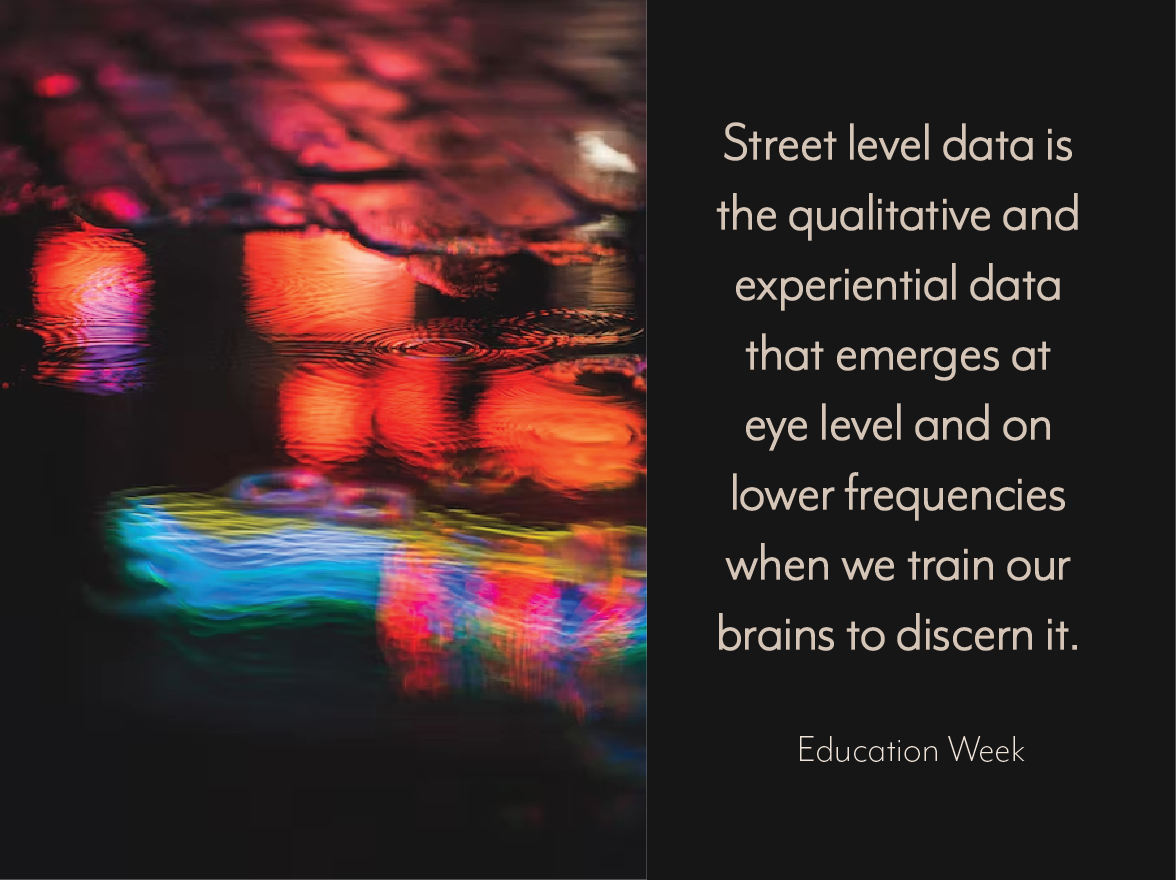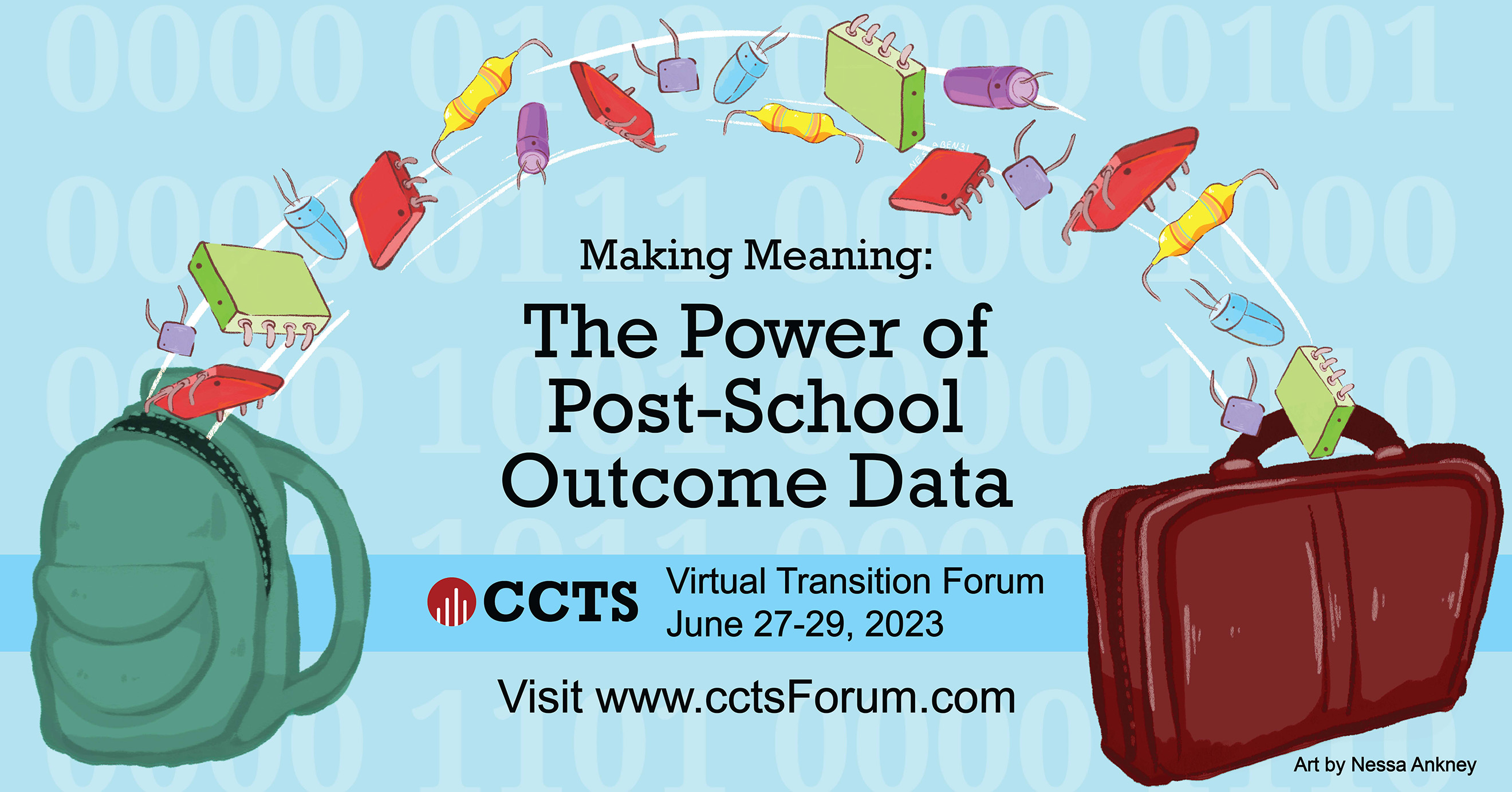We hope you’re enjoying the glimpses of sunshine and warmer weather! The quiet stillness of winter has passed, and we’re officially in busy, spring mode. At CCTS, our focus this time of year is on the Post-School Survey—both reviewing and exploring the data from last year while also preparing to collect a new set of data this year.
In this newsletter, we’re excited to share registration information about our summer virtual forum, highlight our keynote speaker who utilized post-school outcome data in her doctoral research, and remind you of some upcoming dates and resources related to the 2023 survey.

Street Data and Post-School Outcomes
For over 20 years, CCTS has worked with districts across Washington state to conduct the annual Post-School Survey. Through the survey, we’re able to gather information from former students with disabilities about their rates of engagement in postsecondary education and employment activities one year after leaving high school. These data are considered high level (or quantitative) data. The information is reported in charts and tables with numbers and percentages.
Beginning in 2019, CCTS added four follow-up questions to the survey to better understand why students were not meeting the criteria to be considered “engaged” in education or employment activities after high school. The answers to these open-ended questions include statements and stories (qualitative data) that allow us to tap into street level data and learn from the voices of young people and their families.

In her doctoral research, Factors affecting on-time graduation for students with disabilities in Washington state (2022), Dr. Cynthia Gale gives us an example of how to focus on street data to understand larger systemic issues. She dug deep into qualitative responses from the Post-School Survey, specifically looking at responses from 2,344 (81.3%) of the 2,882 former students who were categorized as having dropped out of high school over the course of three years.
The survey follow-up question related to dropping out of high school asked:
“Next, I’m going to ask you about your education experience since leaving high school. But before I do, I see you left high school before graduating. Are you willing to tell me why?”
Dr. Gale’s research identified eight themes in the responses to this question. The results of her study and recommendations to address barriers will be presented in the keynote address at the CCTS Virtual Transition Forum this summer. The feedback from former students and their families/caregivers provides us with a greater understanding of those most affected by barriers and inequities and, with Dr. Gale’s findings, gives us insights into potential interventions.
CCTS encourages school personnel who conduct the Post-School Survey to ask the follow-up questions, listen carefully, check for understanding, and share the information with the school team. Our challenge is to use the qualitative, street data as a springboard to include the voices of students and their families/caregivers and bring new perspective to our work. In doing so, we can begin to “transform how we engage in everything from student learning to district information to policy by offering a new way to think about, gather, and deploy data” (Pugh and Safir, 2021, p. 57).
--
References
Education Week. (2021). Street Data: A Next-Generation Model for Equity, Pedagogy, and School Transformation. Retrieved from https://www.edweek.org/events/webinar/street-data-a-next-generation-model-for-equity-pedagogy-and-school-transformation.
Gale, C. M. (2022). Factors affecting on-time graduation for students with disabilities in Washington state (16) [Educational and Organizational Learning and Leadership Dissertations, Seattle University]. ScholarWorks.
Pugh, J. and Safir, S. (2021). Street Data: A Next-Generation Model for Equity, Pedagogy, and School Transformation. Corwin Publishers.
Making Meaning: The Power of Post-School Outcome Data
CCTS Virtual Transition Forum | June 27-29, 2023

Post-school outcome (PSO) data provide a picture of life after high school for former special education students in relation to postsecondary education and employment.
Join CCTS for a series of live and prerecorded presentations that highlight how PSO data can be used to inform practice around transition services (including instruction, development of transition plans, activities, and agency collaboration).
Register for the CCTS Virtual Transition Forum
OSPI Tips from the Special Education Division: Secondary Transition Services and Supports
This month, OSPI’s Special Education Update features Tips on Secondary Transition Services and Supports. Developed in collaboration with CCTS, the document provides answers to the question: What is important to know about secondary transition services and supports? It highlights information in the following areas:
- Individualized Decisions about a Student’s Graduation Date and Plan
- Reminders for Secondary Transition Services and Supports for Students Between 16 and 21
- Best Practices for IEP Transition Plans and Transition Services
- Secondary Transition Resources
- Transition and Educational Services for Students Over the Age of 21
- Transition Recovery Services
- Transition Recovery Service Funding
To subscribe to OSPI’s monthly Special Education updates or access additional tip sheets, visit OSPI's Monthly Updates for Districts and Schools.
Free Screening: “My Disability Roadmap”
Tuesday, May 2 | 4:15-5:45 p.m.
Join the UW Haring Center Inclusionary Practices Demo Sites Team for a special viewing of the short film, "My Disability Roadmap." The story is directed by Dan Habib and features his son, Samuel Habib, as well as other disability rights advocates. The feature is 22 minutes long and will be followed by an online discussion. Clock hours provided based on exit ticket responses.
Visit the IPP Demosites Calendar for details and registration.
2023 Post-School Survey (2021-22 leaver year)
Important Survey Dates
- May 22, 2023: Leaver Survey Lists available for review in the TSF2
- June 1, 2023: Post-School Survey opens
- November 1, 2023: Post-School Survey closes, 11:59 p.m.
- January-February, 2024: Post-school outcome reports and presentations published
Visit the Post-School Survey Guidance for Educators page on the CCTS website for details.
Post-School Outcomes, 2020-21 leaver year
Outcomes by ESD and County
Post-school outcomes for 2020-21 leavers are available on the CCTS website by state, ESD, and county. Data are not published for counties with respondent sizes less than 10.
Visit the Post-School Outcome Reports page on the CCTS website to view and download data.
CCTS Self-Paced Online Training
Free Transition Training Materials
Each of CCTS’s self-paced training courses can be accessed free of charge from the CCTS website. Courses include modules and activity workbooks that can be completed individually or with a group. To earn clock hours, courses can be completed through eLearning for Educators for a fee.
- Writing Effective Transition Plans (9 modules)
- Student-Led IEPs (7 modules)
- Developing Job Shadow Experiences (4 modules)
- Partnerships for Inclusion: Special Education and Career Technical Education (5 modules)
Visit CCTS’s Professional Development and Training page for details.
